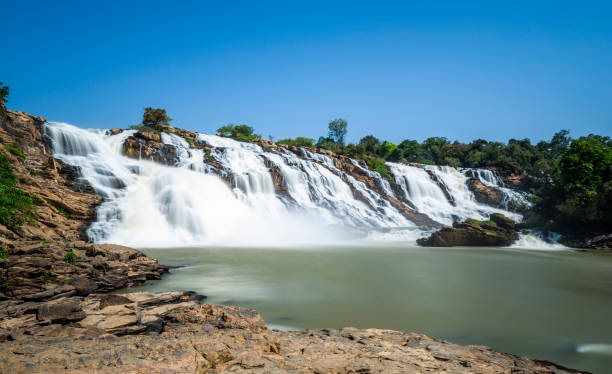The Gurara Waterfall is located in Niger State of Nigeria. It is approximately 30 metres high and 200 metres wide and lies on the Gurara River along the Suleja-Minna road. It remains one of the easiest waterfalls to access in Nigeria due to the hitch-free accessibility from Abuja, the Federal Capital Territory (FCT). Just a 3-hour drive from Abuja in Niger, and an hour's drive from the same Abuja along Kubwa road—meaning that accessibility description depends on where you are coming from.
The waterfall has a very rich history owing to both local culture and tourism. Over the years, it has remained the talk of the region in terms of its serenity, beautiful attractions and nature wears its face. However, the waterfall is named after the Gwari (Gbagyi) and Hausa gods, Gura and Rara which were at a time in the past, worshipped by the indigenous people.
According to oral history, Gurara Waterfalls was discovered by a Gwari hunter called Buba in 1745 before some Europeans discovered it in 1925 after they found it as a recreation centre. Before the discovery of the waterfalls by the Europeans, Gurara Waterfalls was worshipped by people living in communities around it. Oral history also has it that Gurara Waterfalls and Gurara River were named after two deities called Gura and Rara.
Later on, it was developed into a tourist centre which people visit from far and near. It is now recorded as one of Nigeria’s most visited natural tourist attractions, especially during the rainy season when the falls become a torrent. Today, it serves different purposes ranging from picnics, swimming (but swimming is banned in the rainy season probably since the turbulence comes in full), hiking, nature exploration, and outdoor games, as well as contributing to the state's tourism industry. It is very pertinent to note that the waterfall maintains a good and deep relationship with the people living around the area, especially the Gwari people who offer prayers, sacrifices and other related rituals there. Suffice it to say that, it is a place considered sacred. Therefore, they hold it to the bosom of their hearts even though the religion has gradually faded away, it still holds economic value through tourism.
Fortunately, a river flows into the waterfall—supplying it sufficient strength to maintain beauty year in, and year out. The river, too, serves different domestic purposes like cooking, and agricultural purposes like irrigation to nurseries and serving drinking sources for wildlife. Irrespective of the degree of westernization or modernism, it cannot wipe out the cultural heritage and meaning the waterfall holds for the people, especially the Gwari people. Its myths are too powerful; some believe that the waterfall attracts blessings to those who closely associate with it.
Despite the waterfall and the nearby river having tourist appeal, cultural value, economic value, ecological significance(through ecosystem), hydropower generation (if gradually worked on, can help in generating power to not only Niger State but Nigeria at large), it remains virgin potentials which harnessed, becomes of great to the people at large.
As earlier stated, the Gurara waterfall remains one of the most sacred, attractive, aesthetic, serene, calm, and easiest waterfalls in Nigeria.
Credits:
Wikipedia
Trip Advisor

